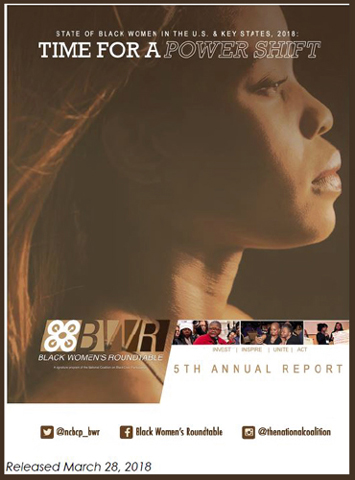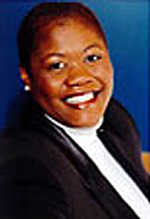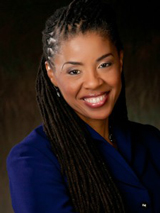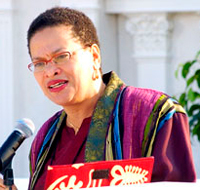Sister Power, Sister Struggle?
By Nisa Islam Muhammad -Staff Writer- | Last updated: Apr 4, 2018 - 5:09:25 PMWhat's your opinion on this article?
New report examines the state of Black women in America

|
The report takes an in-depth look at the issue of power and exactly where Black women fall socially, politically, economically, spiritually and health-wise.

Melanie Campbell
|
“This year, the report is laser focused on showcasing Black women’s intergenerational and diverse leadership, expertise and unique perspectives on the issue of building and sustaining power to achieve a higher quality of life for Black women, our families and communities.”
The group releases the report annually during Women’s History Month and Black Women’s Week. The report’s editor in chief, Avis Jones-Deweever, Ph.D, said during the press briefing, “Black women are key to shifting power whether that be locally or state wide, federally or globally. Black women are key when it comes to leadership in critical social movements across the country and across the world in everything from racial justice to gender justice to environmental justice to labor justice and more.”

Dr. Avis Jones-DeWeever
|
“Black women are making great strides in moving this country and the world forward. However, despite our amazing contributions to our leadership often times Black women’s organizations are not funded substantially for the work that they are doing so there is a mismatch between our level of contribution and the level of funding Black women’s organizations receive to do this work.”
The report is divided into six sections, the Power of Black Women’s Leadership, Political and Voting Power, Power of Social Justice, Economic Power, Health and the Power to Control Your Own Body and Spiritual Power.
The Power of Black Women’s Leadership section explains that Black women’s leadership has had a significant, positive impact across issues and communities. Black women have played a critical role in leading social movements in the U.S. and globally—as organizers, thought leaders, innovators, architects of policy, authoring groundbreaking research and more. Black women provide leadership for progressive movements across the spectrum including racial justice, gender justice, environmental justice, and labor.
The Honorable Minister Louis Farrakhan of the Nation of Islam recently commented on his Facebook page the critical and important elevation and rise of women throughout the world.
“The old-line leadership is finished. It started with the rise of women all over the world saying, in their rise, that men forfeited their right to rule. And now the children have arisen all over the Earth,” Min. Farrakhan’s March 26 Facebook post stated in part.

Tamika Mallory, co-organizer of the Women’s March is a great example of Black women’s leadership. “When my sisters are wining, I’ve already won,” she said March 28 at the “Stateswomen for Justice” luncheon sponsored by the Trice Edney News Wire Service.
Ms. Mallory has been under attack recently for her attendance at a Nation of Islam event where Min. Farrakhan’s remarks were described as anti-Semitic by the Anti-Defamation League (ADL).
“As I go through my own experience of being attacked by people it helps to receive counsel from someone who also doesn’t give two hoots what they say. (She was sitting next to Dr. Julianne Malveaux, economist and former President of Bennett College). We cannot work in silos. That has not worked for us,” she said.
Under Political Power the report says, “At the Congressional level, there is only one Black woman in the U. S. Senate; conversely, in the House of Representatives, Black women make up a larger percentage of House members than they do citizens in the general population. Black women are currently 12.7 percent of the population in the U.S. but make up 18.9% of all women serving in the 115th Session of the House of Representatives. Yet, overall women remain underrepresented in Congress as they make up just over half (50.8%) of the population, but less than a fifth (19.8%) of those in Congress.”

Dr. Julianne Malveaux
|
“Only 12-14 percent turn out to vote. If we increase that by two percent we can tell someone, ‘bye’. If you don’t vote you are still on the menu, you just don’t get served,” she said.
“Stop giving away your vote. Have town hall meetings. Show the initiative that you want your issues addressed…this is Freedom Summer. A movement requires sacrifice. Keep going and Donald Trump ain’t stopping us from going forward,” said Ms. Brazile.
Under Economic Power the report found that Black women are turning to entrepreneurship as a path to greater economic power. According to the report, “Black women are continuing to turn to entrepreneurship, perhaps to escape structural discrimination across race and gender in the labor market. From 1997 to 2016, the number of businesses owned by Black women increased by more than 600%. As such, Black women remain the fastest growing demographic to embrace entrepreneurship in the nation.”
Dr. Malveaux believes another factor to consider is, “You must get the people you vote for to partner in economic distribution. The Koch Brothers can buy a senator like we buy shoes. We want political influence like they have. We need to be talking about reparations because we built this country. We need to be paid,” she said at the luncheon’s panel discussion.
“The unemployment rate is not as important as the wealth gap. We have not made a lot of progress in terms of wealth. We have to put economic issues at the top of our list. One tenth of our dollars are spent at a Black-owned business. Who are we investing with? We have to be mindful of this. We must vote and they must be economic warriors for us,” added Dr. Malveaux.
Another part of economic power is homeownership. Lois Johnson is the President and CEO of United Security Financial Corp. She told the audience that her focus is on how to close the homeownership gap.
“We have dropped from a pre-recession 49 percent to now 42 percent. We lost billions in real estate. Over half of African Americans are renters. We are paying someone else’s mortgage. We have to put our people in a home. Why can’t we put our people in a home?” she asked the audience.
“I am in the business of lending money. I lend money all over the 48 states. Why can’t I do that for my people? I’m committed to getting my people in homes,” said Ms. Johnson.
The National Coalition on Black Civic Participation’s is one of the most active civil rights and social justice organizations in the nation “dedicated to increasing civic engagement, economic and voter empowerment in Black America.”
Dr. Jones-DeWeever shares, “We find ourselves at a very precarious moment in our nation’s history, and Black women understand what’s at stake. They’ve stepped up in bold and tangible ways to not only be the drivers of change but to wield the levers of power themselves like never before.”
INSIDE STORIES AND REVIEWS
-
-
About Harriett ... and the Negro Hollywood Road Show
By Rabiah Muhammad, Guest Columnist » Full Story -
Skepticism greets Jay-Z, NFL talk of inspiring change
By Bryan 18X Crawford and Richard B. Muhammad The Final Call Newspaper @TheFinalCall » Full Story -
The painful problem of Black girls and suicide
By Charlene Muhammad -National Correspondent- » Full Story -
Exploitation of Innocence - Report: Perceptions, policies hurting Black girls
By Charlene Muhammad -National Correspondent- » Full Story -
Big Ballin: Big ideas fuel a father’s Big Baller Brand and brash business sense
By Bryan Crawford -Contributing Writer- » Full Story






 Click Here Stay Connected!
Click Here Stay Connected!








